Caroline Leavitt's Blog, page 20
May 7, 2018
Lisa Romeo talks about grief, healing, and STARTING WITH GOODBYE
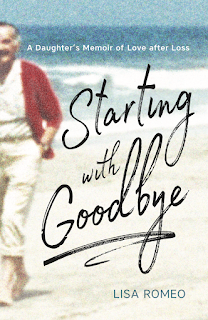
<!-- /* Font Definitions */ @font-face {font-family:"MS 明朝"; mso-font-charset:78; mso-generic-font-family:auto; mso-font-pitch:variable; mso-font-signature:-536870145 1791491579 18 0 131231 0;} @font-face {font-family:"Cambria Math"; panose-1:2 4 5 3 5 4 6 3 2 4; mso-font-charset:0; mso-generic-font-family:auto; mso-font-pitch:variable; mso-font-signature:-536870145 1107305727 0 0 415 0;} @font-face {font-family:Cambria; panose-1:2 4 5 3 5 4 6 3 2 4; mso-font-charset:0; mso-generic-font-family:auto; mso-font-pitch:variable; mso-font-signature:-536870145 1073743103 0 0 415 0;} @font-face {font-family:Georgia; panose-1:2 4 5 2 5 4 5 2 3 3; mso-font-charset:0; mso-generic-font-family:auto; mso-font-pitch:variable; mso-font-signature:647 0 0 0 159 0;} @font-face {font-family:inherit; panose-1:0 0 0 0 0 0 0 0 0 0; mso-font-alt:"Times New Roman"; mso-font-charset:0; mso-generic-font-family:roman; mso-font-format:other; mso-font-pitch:auto; mso-font-signature:0 0 0 0 0 0;} /* Style Definitions */ p.MsoNormal, li.MsoNormal, div.MsoNormal {mso-style-unhide:no; mso-style-qformat:yes; mso-style-parent:""; margin:0in; margin-bottom:.0001pt; mso-pagination:widow-orphan; font-size:12.0pt; font-family:Cambria; mso-ascii-font-family:Cambria; mso-ascii-theme-font:minor-latin; mso-fareast-font-family:"MS 明朝"; mso-fareast-theme-font:minor-fareast; mso-hansi-font-family:Cambria; mso-hansi-theme-font:minor-latin; mso-bidi-font-family:"Times New Roman"; mso-bidi-theme-font:minor-bidi;} p.MsoFooter, li.MsoFooter, div.MsoFooter {mso-style-priority:99; mso-style-link:"Footer Char"; margin:0in; margin-bottom:.0001pt; mso-pagination:widow-orphan; tab-stops:center 3.25in right 6.5in; font-size:12.0pt; font-family:Cambria; mso-ascii-font-family:Cambria; mso-ascii-theme-font:minor-latin; mso-fareast-font-family:"MS 明朝"; mso-fareast-theme-font:minor-fareast; mso-hansi-font-family:Cambria; mso-hansi-theme-font:minor-latin; mso-bidi-font-family:"Times New Roman"; mso-bidi-theme-font:minor-bidi;} a:link, span.MsoHyperlink {mso-style-priority:99; color:blue; mso-themecolor:hyperlink; text-decoration:underline; text-underline:single;} a:visited, span.MsoHyperlinkFollowed {mso-style-noshow:yes; mso-style-priority:99; color:purple; mso-themecolor:followedhyperlink; text-decoration:underline; text-underline:single;} span.FooterChar {mso-style-name:"Footer Char"; mso-style-priority:99; mso-style-unhide:no; mso-style-locked:yes; mso-style-link:Footer;} .MsoChpDefault {mso-style-type:export-only; mso-default-props:yes; font-family:Cambria; mso-ascii-font-family:Cambria; mso-ascii-theme-font:minor-latin; mso-fareast-font-family:"MS 明朝"; mso-fareast-theme-font:minor-fareast; mso-hansi-font-family:Cambria; mso-hansi-theme-font:minor-latin; mso-bidi-font-family:"Times New Roman"; mso-bidi-theme-font:minor-bidi;} @page WordSection1 {size:8.5in 11.0in; margin:1.0in 1.0in 1.0in 1.0in; mso-header-margin:.5in; mso-footer-margin:.5in; mso-paper-source:0;} div.WordSection1 {page:WordSection1;} </style> <br /><div class="MsoNormal" style="line-height: 150%;"><div class="separator" style="clear: both; text-align: center;"><a href="https://4.bp.blogspot.com/-lpUS7cLjve..." imageanchor="1" style="margin-left: 1em; margin-right: 1em;"><img border="0" data-original-height="320" data-original-width="320" src="https://4.bp.blogspot.com/-lpUS7cLjve..." /></a></div><br /><br /><a href="http://lisaromeo.net/">Lisa Romeo</a> is a writer and a writing coach and I am so honored to have her here to talk about her memoir, STARTING WITH GOODBYE. Thank you, Lisa!<br /><br /><b style="mso-bidi-font-weight: normal;">Grief is never-ending, but there must have been a moment when you felt, okay, now I am ready to write this. Can you talk about that moment please?</b></div><div class="MsoNormal" style="line-height: 150%;"><br /></div><div class="MsoNormal" style="line-height: 150%;">There were many different moments. I actually began the writing almost immediately, in the two weeks after my father died, and then on and off for about six years. I went to the page each time I felt that I had something else, something new or what struck me as unusual to record about the grief experience. The writing and the curiosity about the unfolding experience seemed to occur in partnership. Of that early writing, some became essays of different lengths and forms and appeared in literary journals. The rest stayed in my notebook until the structure for the book solidified. </div><div class="MsoNormal" style="line-height: 150%;"><br /></div><div class="MsoNormal" style="line-height: 150%;">There was a point—maybe that moment you’re asking about—when it felt like the right time to transform all the essays and the bits and pieces in notebooks, into a memoir, though I honestly can’t say precisely when that happened or just what the exact impetus might have been. It certainly wasn’t an <i style="mso-bidi-font-style: normal;">aha</i>moment where I thought, “okay, time to move on from grief.” It was subtler than that and was imperceptibly tied to the act of writing. </div><div class="MsoNormal" style="line-height: 150%;"><br /></div><div class="MsoNormal" style="line-height: 150%;">I’d resisted moving from the essay from to a long continuous narrative for a couple of years, despite good advice, because grief to me, even then, still seemed mostly fragmented and episodic, not linear. In late 2015 though, I realized that this book had to happen before anything else, before I could write any <i style="mso-bidi-font-style: normal;">other</i>book. I was getting too comfortable writing short pieces about grief, and grief is not supposed to be so comfortable that you don’t want to move on. It was time. I went away for a week to a quiet bed-and-breakfast in remote Maine in January 2016 to get started.</div><div class="MsoNormal" style="line-height: 150%;"><br /></div><div class="MsoNormal" style="line-height: 150%;"><br /></div><div class="MsoNormal" style="line-height: 150%;"><b style="mso-bidi-font-weight: normal;">One of the things that people may not realize is that when a person dies, the relationship does not. You still can work on that relationship. Can you talk about how you came to see your father differently?</b></div><div class="MsoNormal" style="line-height: 150%;"><br /></div><div class="MsoNormal" style="line-height: 150%;">When my father was still alive, even in his final two years when he was dealing with Alzheimer’s, severe arthritis, heart disease and other ailments, to a certain extent we were still playing out roles I believe got decided in my childhood and teen years. <span style="mso-spacerun: yes;"> </span>We were locked in those roles: he was the self-made, successful businessman without much education, who always had to be right, and I was the modern daughter with the privilege of higher education, who felt I needed to align with my mother, and who had to prove that I was his equal and that we were nothing alike. </div><div class="MsoNormal" style="line-height: 150%;"><br /></div><div class="MsoNormal" style="line-height: 150%;">The joke was on me. After he died, there was nothing left to struggle against anymore, and I got curious about why we had so often been at odds, why it was that we had a lot in common but didn’t want to admit it. The reality was that the friction came from being so very much alike. Once he was gone, I felt free to ask myself questions about his life, his behavior and decisions, that I hadn’t bothered to investigate before, because I’d been, frankly, a rather dismissive snob. </div><div class="MsoNormal" style="line-height: 150%;"><br /></div><div class="MsoNormal" style="line-height: 150%;">I found that I was able to come to know my father differently, that I had more of an open mind, and he thus became an even bigger part of my life than in the years before his death. In that way, the relationship seemed to continue and even, in a sense, flourish.</div><div class="MsoNormal" style="line-height: 150%;"><br /></div><div class="MsoNormal" style="line-height: 150%;"><b style="mso-bidi-font-weight: normal;">The phrase “Love after Loss” really resonated with me. Can you talk about what this feels like for you?</b></div><div class="MsoNormal" style="line-height: 150%;"><br /></div><div class="MsoNormal" style="line-height: 150%;">When Dad and I had “conversations” after he was gone, so many things came clear for me; I had patience and curiosity then which had been lacking when he was alive. At first there was a certain amount of shame involved for how I’d treated him at times in my adult life, but that faded because I felt so much love and acceptance in return—which I now interpret as my finally grasping the depth of his love for me, something which he wasn’t really ever able to express in life (and I wasn’t open to hearing either).</div><div class="MsoNormal" style="line-height: 150%;"><br /></div><div class="MsoNormal" style="line-height: 150%;">When our parents age and decline, there are so many mixed emotions—even though we act from love and compassion, for many adult children I think there may also be guilt, impatience, confusion, exasperation, inadequacy, judgment, bewilderment, all churning and distracting us. There certainly was for me. But once he was gone, and I was able to think about, acknowledge and process all of that, there was a certain calm. And the only thing left, was love.</div><div class="MsoNormal" style="line-height: 150%;"><br /></div><div class="MsoNormal" style="line-height: 150%;"><b style="mso-bidi-font-weight: normal;">What kind of writer are you? Do you map things out? What was it like to write this particular book?</b></div><div class="MsoNormal" style="line-height: 150%;"><br /></div><div class="MsoNormal" style="line-height: 150%;">For short pieces, I usually know where I want to begin and where I will end. The middle is a mystery and I mean that in the best way; I enjoy figuring out how to get from A to Z, even if that means a number of rewrites and/or if it takes me in some unexpected direction in form. </div><div class="MsoNormal" style="line-height: 150%;"><br /></div><div class="MsoNormal" style="line-height: 150%;">For a few years, I saw this as a book of linked essays. Publishers and some trusted beta readers didn’t agree, and I was stuck for a while. Then I decided to take their advice and rework it as a more traditional memoir. For someone like me who feels like an essayist at heart, that was a rather frightening step, but eventually the right one.</div><div class="MsoNormal" style="line-height: 150%;"><br /></div><div class="MsoNormal" style="line-height: 150%;">Because I had the challenge of breaking down a number of pre-exiting essays and weaving that material into the longer narrative I was writing, I felt I needed a firm chronological frame—beginning two months before Dad died and ending two-and-a-half years after. But inside of those bookends, the narrator needed to be able to move around in time—back, way back, a little ahead, and then always returning to the unfolding moment. </div><div class="MsoNormal" style="line-height: 150%;"><br /></div><div class="MsoNormal" style="line-height: 150%;">I made probably five different chapter outlines, and then when I had a crappy first draft, I printed it all out, got a pair of scissors and a roll of tape, cut things up according to events and theme, and put it all together again. Several times. Then as I poured it all back into the computer, I revised heavily and rewrote. Rinse, repeat. After five months, I had a fairly polished manuscript and began submitting.</div><div class="MsoNormal" style="line-height: 150%;"><br /></div><div class="MsoNormal" style="line-height: 150%;"><b style="mso-bidi-font-weight: normal;">What’s obsessing you now and why?</b></div><div class="MsoNormal" style="line-height: 150%;"><br /></div><div class="MsoNormal" style="line-height: 150%;">A few things. First, what the next book will be. I have three different ideas, and when I tell them to the few people I want advice from, I get wildly different feedback. One involves horses—I rode and competed for many years, and horses were the first thing I ever wrote about, first as a kid for fun, and then later professionally. The second is another family-centered memoir. The third is a combination reported and personal narrative.</div><div class="MsoNormal" style="line-height: 150%;"><br /></div><div class="MsoNormal" style="line-height: 150%;">Besides the sophomore book question, I’m constantly upset by the state of the country, the divisive society that my (college-age) sons will be inheriting. Finally, I’m always obsessed with watching British crime dramas, and dark chocolate.<br /><br /><b style="mso-bidi-font-weight: normal;">What question didn’t I ask that I should have?</b></div><div class="MsoNormal" style="line-height: 150%;"><br /></div><div class="MsoNormal" style="line-height: 150%;">By now I figured someone would have asked, “What do you think your father would say about the book?”, so I’ll go with that. The answer is, I don’t think he’d <i style="mso-bidi-font-style: normal;">say</i> much at all to me directly, as was his way. But at some point, I’d probably overhear him telling other people, “My daughter wrote a bestseller!” That will of course have <i style="mso-bidi-font-style: normal;">no</i>foundation in reality! When I was a low-level staffer in a midsized public relations agency, he’d boast, “My daughter is a top executive at one of the best PR firms in New York City.” When I’d hear that, I’d get so frustrated and wonder why he had to brag so. I sure wouldn’t mind hearing him bragging like that now though.</div><div class="MsoNormal" style="line-height: 150%;"><br /></div><b>Buy the book here: </b><br /><div class="MsoNormal" style="background: white;"><br /></div><span style="mso-bookmark: _Hlk506304916;"></span> <br /><div class="MsoNormal" style="background: white;"><a href="https://www.blogger.com/null" name="_Hlk506304965"></a><a href="https://www.indiebound.org/book/97819... style="mso-bookmark: _Hlk506304965;"><span style="font-family: "inherit" , "serif"; font-size: 10.5pt;">https://www.indiebound.org/book/97819... style="mso-bookmark: _Hlk506304965;"><span style="color: #1d2129; font-family: "inherit" , "serif"; font-size: 10.5pt;"> </span></span></div><span style="mso-bookmark: _Hlk506304965;"></span> <br /><div class="MsoNormal" style="background: white;"><br /></div><div class="MsoNormal" style="background: white;"><a href="http://unevadapress.com/books/?isbn=9... style="font-family: "inherit" , "serif"; font-size: 10.5pt;">http://unevadapress.com/books/?isbn=9... style="color: #1d2129; font-family: "inherit" , "serif"; font-size: 10.5pt;"> </span></div><div class="MsoNormal" style="background: white;"><br /></div><div class="MsoNormal" style="background: white;"><a href="http://www.watchungbooksellers.com/bo... style="font-family: "inherit" , "serif"; font-size: 10.5pt;">http://www.watchungbooksellers.com/bo... style="color: #1d2129; font-family: "inherit" , "serif"; font-size: 10.5pt;"><span style="mso-spacerun: yes;"> </span>(Signed on request)</span></div><div class="MsoNormal" style="line-height: 150%;"><br /></div><div class="MsoNormal" style="line-height: 150%;"><a href="http://lisaromeo.net/"><br /></a> </div><div class="MsoNormal" style="line-height: 150%;"><b><br /></b></div><div class="MsoNormal" style="line-height: 150%;"><b>Social media: </b></div><div class="MsoNormal"><a href="https://twitter.com/LisaRomeo"&g... style="font-family: "georgia"; mso-bidi-font-family: "Times New Roman"; mso-fareast-font-family: "Times New Roman";">https://Twitter.com/LisaRomeo</spa... class="MsoHyperlink"><span style="font-family: "georgia"; mso-bidi-font-family: "Times New Roman"; mso-fareast-font-family: "Times New Roman";"></span></span></div><div class="MsoNormal"><br /></div><div class="MsoNormal"><a href="https://facebook.com/LisaRomeoAuthor&... style="font-family: "georgia"; mso-bidi-font-family: "Times New Roman"; mso-fareast-font-family: "Times New Roman";">https://Facebook.com/LisaRomeoAuthor&... style="font-family: "georgia"; mso-bidi-font-family: "Times New Roman"; mso-fareast-font-family: "Times New Roman";"></span></div><div class="MsoNormal"><br /></div><div class="MsoNormal"><a href="https://instagram.com/LisaRomeoWriter... style="font-family: "georgia"; mso-bidi-font-family: "Times New Roman"; mso-fareast-font-family: "Times New Roman";">https://Instagram.com/LisaRomeoWriter... class="MsoHyperlink"><span style="font-family: "georgia"; mso-bidi-font-family: "Times New Roman"; mso-fareast-font-family: "Times New Roman";"></span></span></div><div class="MsoNormal" style="line-height: 150%;"><br /></div><div class="MsoNormal" style="line-height: 150%;"><br /></div>
Published on May 07, 2018 11:26
May is Short Story Month and that means incredible collections from Jane Ciabattari, Abby Frucht, Dawn Raffel, and more, all from Dzanc
Grab a bundle of short stories, on sale all month
MAY IS SHORT STORY MONTH!
Dzanc is proud to offer more than 100 short story
collections in its print and rEprint series. Pick up
a few of these great titles in May. And as an added
celebration of Short Story Month, Dzanc is offering
a #ReadWomen special: order three collections by
women and take 35% off. Use the code
READWOMEN at checkout, 4/30-5/31
Check theses great story collections out HERE!
[image error] I am featuring Jane Ciabattari here because A. she's amazing and B. Her whole collection is amazing. Set in the San Francisco Bay Area, El Salvador, New York City, Montreal, and Montauk, the haunting stories in Stealing the Fire throb with the joys and pains of life-changing events. And check out my interview with Jane Here!
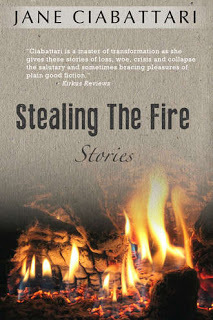
Published on May 07, 2018 11:07
The brilliantly funny Stephen McCauley talks about MY EX-LIFE. college personal essays, Airbnbs, why he hates mac and cheese, and so much more.
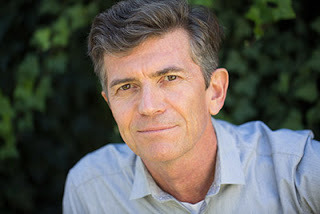
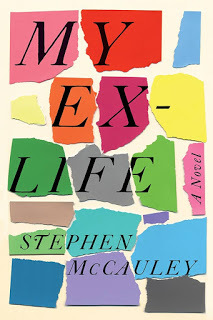
Come on, who doesn't adore Stephen McCauley? I know I do. I first met him at a book salon, and we bonded over really bad movies. (Cabin on the Lake, anyone?) Subsequently, we stay in touch, I see him at readings and I stalk him on social media. He's a genius writer, hilariously funny, and despite his aversion to it, he DOES make a mean mac and cheese.
He's the acclaimed author of The Object of My Affection (which was made into a great movie starring Jennifer Anniston), The Easy Way Out, The Man of the House, True Enough, Insignificant Others and Alternatives to Sex.
I absolutely adored his newest novel MY EX-LIFE, about lives coming apart and together, old relationships and new ones, and college personal essays (Oh my God, I LIVED that one.) And I'm not the only one. It's an Indie Next Pick, a Publisher's Lunch Buzz Book, and an Amazon Top 20 books for Spring. Check out these other raves:
“An irresistible doozy of a plot. With My Ex-Life, a heartwarming comedy of manners about second chances and starting afresh, he has pretty much outdone himself...McCauley fires off witticisms like a tennis ace practicing serves... Warm but snappy, light but smart—and just plain enjoyable.” Heller Mcalpin, NPR.org
“As always, McCauley’s effervescent prose is full of wit and wisdom on every topic—college application essays, Airbnb operation, weed addiction, live porn websites, and, most of all, people. ‘When everything looks perfectly right about a person, there’s usually something significantly wrong.’ ‘All couples start off as Romeo and Juliet and end up as Laurel and Hardy.’ A gin and tonic for the soul.” Kirkus Reviews
“McCauley delights with intimately, often hilariously observed characters and a winking wit that lets plenty of honest tenderness shine through. Readers will love spending time in these pages.” Booklist, starred review
You have this astonishing talent for creating characters we just adore. I truly want Julie to be my best friend, and I want her to bring David along, too. How do you go about creating character?
I’m delighted to hear you like them. I wrote most of the novel during the spring, summer, and fall of 2016—a traumatic time for someone with my political view of the world. I loved opening my notebooks and stepping out of my universe and into theirs. I give my students lots of craft tips for character development, but the only key I know to creating truly three-dimensional people on the page is to start with an idea of characters in a situation rather than starting with a plot. Once you make characters secondary or subservient to a story, they tend to get a little flat. You can see the marionette wires and the author’s hand pulling them. If I have a good sense of the people I’m dealing with, I take a see-what-happens approach. The main story that drives My Ex-Life emerged directly from David’s career as college counselor, not from a planned and outlined plot. It’s not the most efficient way to write, I know, but I think it has value. Stephen King has a great chapter about this in his terrific book On Writing.
Having survived the college essay period four years ago, I loved reading about it again because it all sounded so familiar to me. (We, two writers, could not really help our son and we hired someone because she showed us this wonderful essay a kid had written about how he wanted to be among wild horses in Montana and “run, run, run.” And his father, of course, despite her please, made him change it to something boring about making a difference in the world of finance. Do you do this work? How do you know so much about it?
I’ve worked on college essays for the children of several friends and also two of my nephews. Doing it, I gained a ton of insight into their families and the kids’ real feelings about their parents. That’s why I chose that profession for my character—indirect participation in the lives of others. I think that explains why you two writers couldn’t really help your son—your participation is too direct! I’ve been teaching at the college level for thirty years, and I’m astonished at how much drama has emerged around what was once a fairly straightforward process. My parents had only a vague awareness of where I was applying. My awareness was probably more vague than theirs, come to think of it. For research, I interviewed an admissions officer at Harvard about the importance of essays (less than most people assume, it turns out!) and novelist Elizabeth Benedict who has created a successful business coaching essays. She gave me some great insights. It’s easier to make things up when you’re standing on a somewhat solid foundation of fact.
Same question re selling and restoring houses, please.
I had the good fortune of having three of my books made into movies. One here and two in France. I used the money to buy two pieces of real estate, both intended as writing retreats. Unfortunately, I found I was too worried about renovations and upkeep when I was in them to get writing done. So I made both short-term rentals. (“Airbnb’s” is the accepted generic term. Like “Kleenex” for facial tissues.) Now I use the money I earn from renting them to rent other people’s apartments in places around the country. I go, burrow in for a couple of weeks and couldn’t care less if the ceiling falls in around me. Julie’s Airbnb operation in My Ex-Life is based on those experiences. Especially her experiences with throw pillows. Airbnb rentals always have way, way too many throw pillows. I usually photograph them as soon as I check in and send the pictures to a few friends to prove I’m not making it up. I turned pillows into a running gag in this novel. I liked exploring the Airbnb world in My Ex-Life because millions of people are sharing their most intimate spaces—kitchen, bathrooms, bedrooms—with complete strangers. It opens up all kinds of story possibilities.
I also absolutely loved the relationship between David and Julie, their deep affection for one another. Do you think part of what stops us from moving on is just plain old terror of the new, and if so, what do we do about it?
I think there’s too much emphasis on the importance of “moving on” as a value in and of itself. Sometimes a more nuanced adaptation to what is is the better solution. I love when people have crazy, complicated living situations with exes or make accommodations for lovers or destitute relatives. When people truly open up about their relationships, their marriages, you discover no one’s life is as simple as it seems from the outside.
Ah, let’s talk about mid-life. What I loved so much about your novel is that it DOES spark second chances. (My mom fell in love for the first time at 93!) which is sort of thumbing your nose at all this societal dictates of who should be doing what at what age. So…as you see it, there are too second acts in American life. Can you talk about this, please?
To be embarrassingly frank, I’m surprised at how desire and even opportunities linger into (and past!) midlife. On the other hand, you absolutely cannot talk about your sex life past age fifty. No one wants to hear. If you don’t want to be celibate, you have to pretend you are. Like wearing a wedding ring, it signals that you’re available. As for second chances, an astonishing number of folks are using social media to look up, investigate, and/or cyber-stalk old paramours, high-school sweethearts, or ex-spouses. They claim it’s totally innocent, but let’s face it, it never is. Exes knew us when we were younger, less wrinkled, less jaded, more firm and fit. They still see the aura of that surrounding us when they look at us. The second chances in My Ex-Life aren’t like the wonderful one your mother had with a new person, but a reconfigured relationship with an old love and best friend. I find there’s tremendous sweetness and tenderness in that.
What kind of writer are you? Do you freak out or panic? You make it seem so effortless.
I used to be a “freak, panic, fall-asleep-for-two-days” kind of writer. Now that I am the age that I am, I’ve calmed down a lot. I care as much about doing good work, but I don’t see my entire life hinging on the success of every sentence. Oddly enough, this has made me work harder and dig deeper. I don’t have the energy for freak-outs and all-nighters. I take my notebooks to the library and remind myself that I’m not Dostoyevsky. Espresso also helps.
What’s obsessing you now and why?
In a literary sense, I’ve been obsessed with Anita Brookner for a couple of years now. Not individual novels but her whole body of eccentric work. As of last summer, 20th-Century Japanese novels. Mishima and Tanizaki especially. In music, I’ve been listening to the droning, unmelodic, electronic music of Loscil. It drowns out the political news, which is what’s really obsessing me, to the detriment of my mental and physical health.
What question didn’t I ask that I should have?
I don’t know, but you didn’t ask the question you shouldn’t have asked---“What are you working on now?”—and for that, I’m thankful.
And (inside joke) made any mac and cheese lately? There is excellent vegan cheese for that, now. Just saying.
You graciously included me in an article you wrote about mac and cheese for the Boston Globe. I remember something about aged Gouda. I was very grateful, and a bunch of people told me they made the recipe. I guess I can now confess that I don’t really love mac and cheese! Don’t hate me, okay? Even as a kid I didn’t love it. My mother—who was Italian and a fantastic cook—made it out of spite on nights when my father didn’t come home for dinner. She was thumbing her nose at him by feeding it to us. I don’t understand the logic. But I love knowing that this is part of our history. We’ll never have Paris, but we’ll always have mac and cheese!<!-- /* Font Definitions */ @font-face {font-family:"MS 明朝"; mso-font-charset:78; mso-generic-font-family:auto; mso-font-pitch:variable; mso-font-signature:-536870145 1791491579 18 0 131231 0;} @font-face {font-family:"Cambria Math"; panose-1:2 4 5 3 5 4 6 3 2 4; mso-font-charset:0; mso-generic-font-family:auto; mso-font-pitch:variable; mso-font-signature:-536870145 1107305727 0 0 415 0;} @font-face {font-family:Cambria; panose-1:2 4 5 3 5 4 6 3 2 4; mso-font-alt:Cambria; mso-font-charset:0; mso-generic-font-family:auto; mso-font-pitch:variable; mso-font-signature:-536870145 1073743103 0 0 415 0;} /* Style Definitions */ p.MsoNormal, li.MsoNormal, div.MsoNormal {mso-style-unhide:no; mso-style-qformat:yes; mso-style-parent:""; margin:0in; margin-bottom:.0001pt; mso-pagination:widow-orphan; font-size:12.0pt; font-family:Cambria; mso-ascii-font-family:Cambria; mso-ascii-theme-font:minor-latin; mso-fareast-font-family:"MS 明朝"; mso-fareast-theme-font:minor-fareast; mso-hansi-font-family:Cambria; mso-hansi-theme-font:minor-latin; mso-bidi-font-family:"Times New Roman"; mso-bidi-theme-font:minor-bidi;} .MsoChpDefault {mso-style-type:export-only; mso-default-props:yes; font-family:Cambria; mso-ascii-font-family:Cambria; mso-ascii-theme-font:minor-latin; mso-fareast-font-family:"MS 明朝"; mso-fareast-theme-font:minor-fareast; mso-hansi-font-family:Cambria; mso-hansi-theme-font:minor-latin; mso-bidi-font-family:"Times New Roman"; mso-bidi-theme-font:minor-bidi;} @page WordSection1 {size:8.5in 11.0in; margin:1.0in 1.25in 1.0in 1.25in; mso-header-margin:.5in; mso-footer-margin:.5in; mso-paper-source:0;} div.WordSection1 {page:WordSection1;} </style>
Published on May 07, 2018 11:03
April 29, 2018
Jane Green talks about her incredible new novel THE SUNSHINE SISTERS, chosing flying as her superpower, and more!
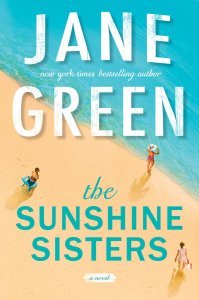

I first met Jane Green at a big, so-crowded-you-could-not-breathe, literary party. I remember her because she said, "Don't you feel like sticking an ice pick in your eye?" and I burst out laughing. I adored her for that. And then later, she invited me to be videotaped for her book club and I told her I loved her books and then we both cried a little. Meeting Jane in person was amazing. First, she has an accent! Second, she's hilarious and smart. Third, I felt so comfortable with her, she could have done the interview with both of us in our pajamas. I love Jane Green.
She is the author of nineteen novels, including seventeen New York Times bestsellers. She has over ten million books in print, is published in over 25 languages, and has several books in development for film and TV.So, she's written THE SUNSHINE SISTERS, a fantastic novel about the ties that bind us, the ones that garrote us, too. Three sisters have to face the lives they've created as their mother is losing hers. And here come the starred reviews:
"Another perfect beach read for sisters, estranged or not." Kirkus
"Green does a wonderful job of creating realistic and lovable (despite themselves) characters." Library Journal
Thank you so much for letting me badger you with questions, Jane! (And for teaching me English slang that isn't rubbish.)
I’m a sucker for novels about sisters, and fractured families, and by page 2, I was in love with The Sunshine Sisters. But you’ve said that you abandoned it for a while, and then went back to writing it? Why? What was it about the book that made you unsure where it was going? And what made you able to pick it up again and finish it?
I wrote a large chunk of it in a tiny cottage on the beach in Guilford, Connecticut which I rented for a week as a writing retreat, determined to get my new book off the ground, but something about it wasn’t right (not least that it was freezing). Towards the end of a week of pure slog, I realized I had no idea who the characters were, so when I got back home I decided to abandon it to write Falling. But a year later I found myself thinking about it, and had a quick read through to check it really was a waste of time. And what I found was that I had the eldest daughter Nell, very clearly, and I had Ronni. And there was so much there that worked. I realized that if I put the work into the two other sisters, Lizzy and Meredith, the book would then tell itself. And second time around, it completely came alive and wrote itself, and was an absolute joy – I would look forward to sitting at my desk every day to see what my characters would do that day.
I absolutely loved Ronni, the not-so-great mom who calls her adult daughters home when she discovers she has a serious illness. I loved all of the daughters, too, and because every one was so complex and alive, I wanted to know how you go about building a character. Do you map the changes out or do they happen organically?
Nell came to me organically, but I had to map out Lizzy and Meredith, and first time round, I didn’t get them. Second time round, however, their voices shouted at me from the page, especially Lizzy’s. She was so vibrant and alive, she really took the story in all kinds of directions I hadn’t intended.
Every time I start a new novel, I get writers’ amnesia and forget how to do it. I don’t learn a thing from previous novels, it seems. Is it that way for you? Does every novel you write feel different than the one before?
Every time I start one I wonder how in the hell I’ve ever done it before, and am convinced that this is the one where I will run out of juice halfway through. Every one does feel different, although I will be honest and confess I am ready for something of a new challenge. I suspect this is probably less about the stories and more about my life – seventeen years in suburbia has taken its toll. I’ve been mired in suburban stories for a while and I think I am done with that, but we shall see what the future holds.
You have over ten million books in print, 19 novels, published in 25 languages, have books in development, you run a brand new amazing book club (Thank you for hosting me!), you have zillions of animals, and you’re an amazing cook! How do you manage to do all that you do?
I have two modes: on, and off. I’m either running around like a crazy woman, or I’m in bed. And when I say I’m in bed, that can mean for days. I also don’t have much of a social life. I was once told that after the age of forty you can divide your life into work, family, and friends, and you do not get to successfully juggle more than two. If that is true, the two I have chosen to juggle are work and family. I adore my friends, but my priorities are family and work, and I daresay an active social life would prevent me from doing all that I do.
Plus, you’re so respected and beloved in the literary community, and so generous to other writers, that I wonder if you can give two of the most important pieces of writing advice you know here?
Coming from you, the most generous writer I know, that’s the highest praise of all! I would say that writing is a discipline, and a job; that however you feel and whether you are inspired or not, you must sit down and write, because that is the only way books get written. The other essential piece of advice is get an agent who is passionate about your work, and who believes in you wholeheartedly. I have made the mistake, more than once, of having an agent who is entirely disinterested, and in one case, clearly thought my work beneath them. Someone who is not passionate about you, or who doesn’t “get” you, will never be able to do a good job selling your work.
What’s obsessing you now and why?
I am still obsessed with Big Little Lies. It is rare for a television show to be as good as, or perhaps even better than, the original book. The adaptation of Big Little Lies just blew me away – the setting, the actors, the music; I don’t know how they got it so right, and I wish someone would pour some of that secret sauce on me.
What question didn’t I ask that I should have?
If you had a choice of flying or invisibility as a secret superpower, which would you choose? I would choose flying, because I don’t want to hear what other people are saying about me – whenever you lurk, you generally hear something you do not want to hear. Flying would be excellent, especially given my increasingly bad night vision.
Published on April 29, 2018 16:42
April 19, 2018
What is it like to be an immigrant kid in Yugoslavia? The divine Sofija Stefanovic talks about Miss Ex-Yugoslavia, about being an introvert who writes a memoir, and so much more, including, "What is Smoki and why should we eat it?"
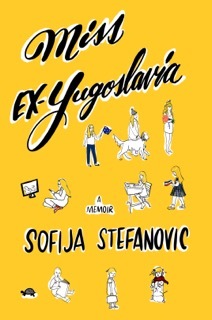
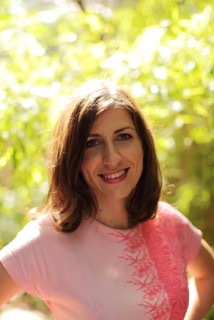
“Sofija Stefanovic’s beautiful memoir Miss Ex-Yugoslavia depicts the elegant transit of a girl becoming an artist. This is a story we yearn to know: How does a girl lose her childhood, family, and nation, yet nurture her memories, dreams, and art? Stefanovic hits all her marks, and she keeps us in her thrall.” —Min Jin Lee, author of Pachinko, a New York Times bestseller and National Book Award finalist
As soon as I saw the word Yugoslavia, I knew I had to read this book. Sofija Stefanovic's Miss Ex-Yugoslavia, a memoir that is both funny and strange (in the best way), is also a brave and moving look at belonging to a country--and trying to belong to yourself.
Sofija writes, tells stories with The Moth and hosts This Alien Nation and Women of Letters New York. Find her working at The Wing. Thank you so much, Sofija!
I always want to know what is haunting a writer to write a particular book. Since this is a memoir, I’d want to know what the why now moment was, what made you feel, oh okay, now I feel ready to write my life?
I’ve always told stories about my life, and imagined writing them but never had the guts to actually do it. I moved to New York City a couple of years ago and I knew no one. This was quite liberating, and gave me the confidence to go on stage at a Moth storytelling event – I figured if it was terrible, I knew no one so it wouldn’t matter. The audience was so nice and encouraging that it made me think: hey, maybe people are interested in the stories of a Yugoslavian immigrant kid living in Australia. So that’s when I sat down and started writing; funny and dark anecdotes about my life and the themes that interest me: immigration, belonging and finding a place in this world, striving to be an artist.
“An outsider looking for home” seems to be to be the perfect job description for a writer. We find our homes in our pages, in the questions we ask that our prose answers, in a way. So, how did you change when you finished writing this?
I feel like writing my coming-of-age story helped me to grow up. This book is a goodbye to my childhood, which is a funny thing to say, as I’ve been an adult for a while now! But truly, the stories and questions of my childhood are the ones I’ve been going back to, that have been haunting me for a long time: what is my identity? Where is home? What role does ethnicity play in my life? How does one become an artist? And it’s not that I’ve answered questions, but I’ve explored them in depth, and now I can go on to nutting out other issues on paper!
The book is absolutely hilarious, even the face of many terrible, horrifying things going on. And it’s also incredibly brave and honest. You’re a storyteller, so sharing your life out loud is in your genes, most likely, but that said, was there ever any moment while you were writing this, this that you felt—no, I can’t write this, I can’t say this about that person.
I often ask myself “Why did I write a memoir, when I’m an introverted person?” I really sometimes wonder why memoirists write, when it’s like hacking off a part of yourself and sending it out into the world, vulnerable and squishy. And I’m a people pleaser, so I am terrified of people not liking it. So yes, there are always moments where I think: “I can’t say this”, or “what if people don’t like it?” But in the end, this is a collection of thoughts and memories – there’s a messiness to art, and not everyone will like it. So I have to think: some people will like it, others will not, and that’s fine.
There’s a part in the book where you talk about life being a series of people traveling away from and toward one another—which is sort of your relationship to your homeland, right? That love/hate relationship—is it still going on?
I was born in Yugoslavia, before it collapsed, so that country, literally doesn’t exist. I don’t feel like current-day Belgrade is my home: when I go back there, I feel like an outsider. I have learned, as time has passed and I’ve grown up, that the “home” I’m always searching for is in my mind – it’s my memories of childhood and it’s the way I feel when I’m with my loved ones. It’s not a physically tangible place.
Can you talk about what it was like to write this book? Did you have rituals, like two candy bars every hour, to keep going, or an IV of coffee? Did you know the shape of this book before you even started or did it seem to come organically?
I knew I’d follow a pretty straightforward chronological structure, starting with my birth (which was really fun to write, because I obviously don’t remember it, so I got to use my imagination a lot). For the rest of the chapters, when I was trying to remember a time in my life, I would try to relax as much as possible, access my memories by listening to music, or talking to my mother and then just do as much stream of consciousness writing as possible. Then I’d go back and structure it into a more coherent narrative. I found Mary Karr’s book The Art of Memoir very useful.
What’s obsessing you now and why?
I want to write fiction! I think I’ve had enough writing about of my own life right now, so I’m very keen to sink my teeth into something different and new. I’m still quite shy about it though. I’m just thinking of scenes and writing them free-hand in a notebook. When starting a new project, I find sitting at a computer intimidating, so I’ll just “doodle” in my notebook like it’s no big deal, and as I doodle, hopefully my confidence will grow and I’ll be able to translate it into something more serious.
What question didn’t I ask that I should have?
Maybe: what is Smoki and why should I eat it?
Ah yes. In the prologue, where I find myself part of a weird Miss ex-Yugoslavia beauty competition above a fruit and veg market in Melbourne, Australia, I mention Smoki, the most delicious ex-Yugo snack ever. Smoki are puffy, crunchy peanut-flavored snacks and you can find them online. I did – and I ordered a truckload to help me write. They were my Proust’s madeline, if you will, taking me back to my childhood with every delicious mouthful.<!-- /* Font Definitions */ @font-face {font-family:"MS 明朝"; mso-font-charset:78; mso-generic-font-family:auto; mso-font-pitch:variable; mso-font-signature:-536870145 1791491579 18 0 131231 0;} @font-face {font-family:"Cambria Math"; panose-1:2 4 5 3 5 4 6 3 2 4; mso-font-charset:0; mso-generic-font-family:auto; mso-font-pitch:variable; mso-font-signature:-536870145 1107305727 0 0 415 0;} @font-face {font-family:Cambria; panose-1:2 4 5 3 5 4 6 3 2 4; mso-font-charset:0; mso-generic-font-family:auto; mso-font-pitch:variable; mso-font-signature:-536870145 1073743103 0 0 415 0;} /* Style Definitions */ p.MsoNormal, li.MsoNormal, div.MsoNormal {mso-style-unhide:no; mso-style-qformat:yes; mso-style-parent:""; margin:0in; margin-bottom:.0001pt; mso-pagination:widow-orphan; font-size:12.0pt; font-family:Cambria; mso-ascii-font-family:Cambria; mso-ascii-theme-font:minor-latin; mso-fareast-font-family:"MS 明朝"; mso-fareast-theme-font:minor-fareast; mso-hansi-font-family:Cambria; mso-hansi-theme-font:minor-latin; mso-bidi-font-family:"Times New Roman"; mso-bidi-theme-font:minor-bidi;} .MsoChpDefault {mso-style-type:export-only; mso-default-props:yes; font-family:Cambria; mso-ascii-font-family:Cambria; mso-ascii-theme-font:minor-latin; mso-fareast-font-family:"MS 明朝"; mso-fareast-theme-font:minor-fareast; mso-hansi-font-family:Cambria; mso-hansi-theme-font:minor-latin; mso-bidi-font-family:"Times New Roman"; mso-bidi-theme-font:minor-bidi;} @page WordSection1 {size:8.5in 11.0in; margin:1.0in 1.25in 1.0in 1.25in; mso-header-margin:.5in; mso-footer-margin:.5in; mso-paper-source:0;} div.WordSection1 {page:WordSection1;} </style> -->
Published on April 19, 2018 10:18
Love strange, inventive stories? Me, too. I talk to Patrick Crerand about THE PAPER LIFE THEY LEAD, which knocked my striped socks off
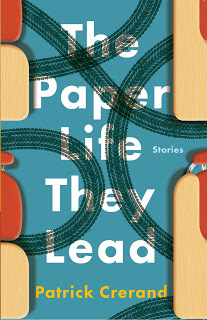
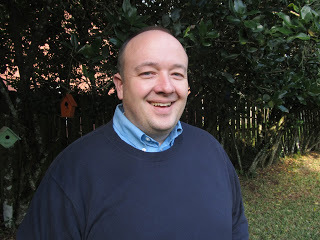
When the brilliant Wiley Cash tells me to read something, I do so, immediately. "You'll love these stories," he told me, and I went wild for them. You will, too. thank you so much, Patrick for being here!
These stories are so jaw-droppingly unexpected. They actually remind me of Dan Chaon’s stories, the matter-of-fact way that you guide us into deeply strange territory. I have to ask you about your own personal world view. I think I want to see the world the way you do for a day. Can you talk about this please?
First, I love Dan Chaon as well, so thanks for that compliment. In graduate school I worked for a lit mag called Mid-American Review, and we published a story by him, and I’ve been a fan ever since. I’ve taught his story “The Bees” for a while now, and I love how he’s able to build what seems like a solid foundation for a character and then in a page or so it just crumbles irrevocably. I’m from Columbus, and he is a Cleveland guy, so I was also happy to know Ohio had him in her stately limits.
For a while there was a disconnect between the way I saw the world and what I wrote. At first I tried to write sad, serious stories that took place in factories because I thought that was presenting something true, even though I really didn’t know or care much about factories or really anything serious. I just did it because I thought that’s what I had to do to be considered a serious writer. My girlfriend (now wife) used to read these stories and just point out all the ways I wasn’t invested in that world, a world she knew well, having a father who had worked his whole life in a brass factory. Slowly, it dawned on me that this kind of aesthetic wasn’t in me and that I had to listen to the voice that was speaking to me the loudest, a voice that wasn’t rooted in realism, a voice that was rarely serious.
I loved reading stories where you have a bizarre or unexpected premise and readers are still invested in that emotional world. At first, I used to think that this method was something only a few writers did or appreciated, but it’s pretty much the basis for every religion and myth ever. Growing up in a pretty heavily Catholic family, that kind of mix of real and crazy mystery was always there, getting reinforced: Jesus was a man but also God and also one with a ghost who sometimes is a bird. It’s like a logic puzzle. But I wasn’t interested in just the bizarre for bizarre’s sake. Maybe at first I was, but a writing teacher once pointed out how the ability to shock people is fine, but that shock is a very short-lived reaction. It gets people's attention, sure, but then what? The moment when the genuine and the bizarre combine is still exciting, but really it's what happens after that interests me. My hope is that by following the characters involved in that moment for as long as I can, the writing will touch on something that sustains and stays with readers after they're done reading.
I was constantly surprised by your stories—like small fireworks going off—and I wonder what surprised you in the writing?
What always surprises me is that people like the stories, by which I mean they laugh at the spots I meant to be funny and care about these characters or even want to publish the stories! It’s a side-effect of spending a lot of time doubting that the stories will work early on. My inner monologue when I’m writing is something like the following: This is ridiculous. You shouldn’t be writing this right now. You should be working on the other story. What happened to that one about the guy in the factory? Let’s write that story. After that passes, usually the moments that surprise me in these stories always happen quite late in the revision process. I remember having a beginning and an end to the story “PIT-DAY” and being somewhat happy with it, and then three months later typing the scene where the ice spins. It came later on because I hadn’t done a good job visualizing the duties of a flight attendant. I just thought about how she’d be carrying a bucket of ice, that the ice would float easily, and from there, later on still, how that iciness encapsulated the worldview of Penelope. Everything is cool on planes—the pilot’s voice, the flight crew’s actions, even the coffee. I don’t know if I pulled all that off, but seeing the ice helped and it surprised me. I try to stay as open minded as I can, just asking myself if I can see it, if it makes sense, if I can push the language or the situation further, and so a lot of surprising moments and objects and people poke through the ether if I look hard enough.
So what’s next for you? Will it be more stories or a novel?I am working on a novel about an extremely wealthy man who has a self-inflicted near death experience in Florida and, after surviving, decides to buy both a Christ-themed outdoor drama and a local fast food restaurant franchise. He eventually combines them into a messianic cult with disastrous consequences. I'm about 2/3 of the way through it, but I still sneak in stories on the side when I can.
Tell us about what kind of writer you are. Do you map things out or just wait for the irritating muse to show up?I write until I get into trouble, and then I usually make some sort of map. In that way I’m very inefficient, but I think I work better if I get little lost first. This is much easier to do when I’m working on a short story than a novel though. I also like having small obstacles to overcome, whether that’s some sort of word count or task or exercise, and then to use that pressure to scare something out of my subconscious and onto the page. That’s the dream, at least. Mostly I try to write as much as I can when I can because I’m pretty busy teaching and keeping my three kids out of trouble. So I squeeze a lot of words out of a little time, and then revise a lot in the hope of finding the breadcrumb trail of the story.
What’s obsessing you now and why?I finished a collection of essays called Apopheniaand that word has been sticking with me lately. It’s an outdated term from psychoanalysis where a person makes connections between unrelated events or ideas. When I was a baby, my parents moved to this small town in Ohio that had been destroyed by an F-5 tornado a few years prior to our moving in. It happened during Holy Week, so a lot of the people I grew up with saw the tornado as some kind of portent. The tornado is sort of nature’s embodiment of apophenia since it combines unrelated and often unwilling elements in the same funnel cloud. A lot of the essays deal with having and losing faith in the midst of chaos, something I think a lot of people are dealing with in our current political environment.
What question didn’t I ask that I should have?
I can’t think of any.
<!-- /* Font Definitions */ @font-face {font-family:Times; panose-1:2 0 5 0 0 0 0 0 0 0; mso-font-alt:Times; mso-font-charset:0; mso-generic-font-family:auto; mso-font-pitch:variable; mso-font-signature:3 0 0 0 1 0;} @font-face {font-family:"MS 明朝"; mso-font-charset:78; mso-generic-font-family:auto; mso-font-pitch:variable; mso-font-signature:1 134676480 16 0 131072 0;} @font-face {font-family:"Cambria Math"; panose-1:2 4 5 3 5 4 6 3 2 4; mso-font-charset:0; mso-generic-font-family:auto; mso-font-pitch:variable; mso-font-signature:-536870145 1107305727 0 0 415 0;} @font-face {font-family:Cambria; panose-1:2 4 5 3 5 4 6 3 2 4; mso-font-charset:0; mso-generic-font-family:auto; mso-font-pitch:variable; mso-font-signature:-536870145 1073743103 0 0 415 0;} @font-face {font-family:Garamond; panose-1:2 2 4 4 3 3 1 1 8 3; mso-font-charset:0; mso-generic-font-family:auto; mso-font-pitch:variable; mso-font-signature:3 0 0 0 1 0;} @font-face {font-family:"Goudy Old Style"; panose-1:2 2 5 2 5 3 5 2 3 3; mso-font-charset:0; mso-generic-font-family:auto; mso-font-pitch:variable; mso-font-signature:3 0 0 0 1 0;} /* Style Definitions */ p.MsoNormal, li.MsoNormal, div.MsoNormal {mso-style-unhide:no; mso-style-qformat:yes; mso-style-parent:""; margin:0in; margin-bottom:.0001pt; mso-pagination:widow-orphan; font-size:12.0pt; font-family:Cambria; mso-ascii-font-family:Cambria; mso-ascii-theme-font:minor-latin; mso-fareast-font-family:"MS 明朝"; mso-fareast-theme-font:minor-fareast; mso-hansi-font-family:Cambria; mso-hansi-theme-font:minor-latin; mso-bidi-font-family:"Times New Roman"; mso-bidi-theme-font:minor-bidi;} p.m-2416187299735636796gmail-msonospacing, li.m-2416187299735636796gmail-msonospacing, div.m-2416187299735636796gmail-msonospacing {mso-style-name:m_-2416187299735636796gmail-msonospacing; mso-style-unhide:no; mso-margin-top-alt:auto; margin-right:0in; mso-margin-bottom-alt:auto; margin-left:0in; mso-pagination:widow-orphan; font-size:10.0pt; font-family:Times; mso-fareast-font-family:"MS 明朝"; mso-fareast-theme-font:minor-fareast; mso-bidi-font-family:"Times New Roman"; mso-bidi-theme-font:minor-bidi;} span.aqj {mso-style-name:aqj; mso-style-unhide:no;} .MsoChpDefault {mso-style-type:export-only; mso-default-props:yes; font-family:Cambria; mso-ascii-font-family:Cambria; mso-ascii-theme-font:minor-latin; mso-fareast-font-family:"MS 明朝"; mso-fareast-theme-font:minor-fareast; mso-hansi-font-family:Cambria; mso-hansi-theme-font:minor-latin; mso-bidi-font-family:"Times New Roman"; mso-bidi-theme-font:minor-bidi;} @page WordSection1 {size:8.5in 11.0in; margin:1.0in 1.25in 1.0in 1.25in; mso-header-margin:.5in; mso-footer-margin:.5in; mso-paper-source:0;} div.WordSection1 {page:WordSection1;} </style> -->
Published on April 19, 2018 10:09
April 7, 2018
What would you do if your long lost daughter comes back to you, then she's murdered, and your husband is suspect? The magnificent Lisa Scottoline talks about AFTER ANNA, and her love affair with Peloton!
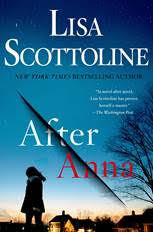
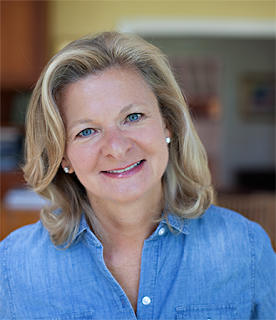
Okay, so what do we know about Lisa Scottoline?She's hilariously funny. Unbeatably generous. And someone I absolutely adore.
Plus, of course there's this: She is The New York Times bestselling author and Edgar award-winning author of 31 novels, including her latest work, AFTER ANNA, which Kirkus calls "a nail-biting thriller." And boy, is it ever. It's about a woman who reconnects with the daughter she gave up 17 years ago, only to have that daughter murdered--and her husband becomes the suspect.
Lisa’s books are on all the major bestseller lists including The New York Times, USA Today, The Wall Street Journal, Publisher’s Weekly, Washington Post, and The Los Angeles Times, and LOOK AGAIN was named “One of the Best Novels of the Year” by The Washington Post, and one of the best books in the world as part of World Book Night 2013.
Lisa’s the recipient of the Edgar Award, the Mystery Writer’s of America most prestigious honor, the Fun, Fearless, Fiction Award by Cosmopolitan Magazine, and named a PW Innovator by Publisher’s Weekly. Lisa was honored with AudioFile’s Earphones Award and named Voice of the Year for her recording of her non-fiction book, Why My Third Husband Will Be a Dog. Each follow up collection, including the most recent, Does This Beach Make Me Look Fat?, has garnered both Lisa and her daughter, Francesca, Earphones Awards as well. In addition, she has been honored with a Distinguished Author Award from Scranton University, and a “Paving the Way” award from the University of Pennsylvania, Women in Business.
Also her last name rhymes with fettucini! (She told me that!) Lisa, so honored to host you again. My blog is your blog, always. And we have to go get pie and coffee!
What sparked this particular book?
It was sparked by so many things, but first was probably my mental rehashing of my own life, a habit I'm hoping I'm not the only woman afflicted with. Frankly, I've never had the famously conventional nuclear family; I've been divorced twice, and in my second marriage, I also became the primary custodian of three adult stepchildren, so I know a fair amount about living life inside a blended family, and it's not always perfect. In fact, many times it's deeply flawed, so I like to approach family from an unconventional way, since that's what I lived, and though it's obvious that none of these characters are from my own life, and of course, Anna is not any of my stepdaughters, I really like to look at how families grow, change, or fall apart in unusual and unanticipated ways, like the long-lost daughter that does come into this family. And I like to look at the changes, stresses, and strains those things create, because in my life, it seems that you either get beyond those things and find a way to reconfigure your familial solar system - or you don't. In my case I didn't. So I wanted to look at that particular family prism, turn it this way and that, and try to figure out what would happen next.
I'm also fascinated by the depth - and the limits to - a mother's love, because as a single mom, that’s something I've lived my whole life. And sometimes in blended families, well-meaning mothers end up overcompensating for their daughters or sons as a sacrifice to their marriage, and the converse is also true. Sometimes I feel like the dynamics of real families have a super-rich subtext that isn't often explored enough, like the various shifting bargains that the players make between each other, the unconscious siding and implicit loyalties that go on, the problems we create for ourselves, and how we survive them. It's so fascinating to me, and always will be. The greatest love can be found at the kitchen table, but also, something far darker.
So much of this extraordinary novel is about the nature of love--love for a husband you thought you knew, love for a daughter you didn't know until now. Can you talk about this please?
Arg, I should have read this question before I answered the last, because “the nature of love” is such a wonderful phrase and of course a brilliant writer like you thought of it! And what I really want to look at is how love exists in some incredible, inchoate, completely ethereal way, in the air, or somewhere inside your soul. You can love that person but never speak to them, or not even speak to them in 10 or 15 years. I have girlfriends who that's true of, and we'll not talk for a whole year and then we do, as the cliché goes, it's like we never stopped talking.
But I also wanted to write about something deeper, like the estrangement that happens in families, because there is, in some ways, no greater test of love.
Let's be real, estrangement in families does happen. Sadly, I have some experience with this myself, and that missing person does leave that-person-shaped hole in your heart. You never quite can reconcile in your mind or how you got estranged, and when people become adults, those gaps become even harder to bridge, not easier. And what comes with that is a certain amount of guilt, shame, and bewilderment, and it’s something I puzzle over a lot, so I thought I would explore that in AFTER ANNA. Can someone really be in the back of your mind for 10 years? For 20? Answer, yes. The greatest lesson for me was that you can't control other people, for good or for ill. And that's something these characters are going to learn, because that's something I have to learn, but I suspect this is the Groundhog Day of Life Lessons. You wake up and learn it every day!
What's obsessing you now and why?
You would think I was such a deep person from these answers, but your questions are always so thoughtful and I know that you're such a great person and such an incredible writer, interested in many of the same issues I am, so I love speaking with you, even this way! Someday we’ll actually get together! And this is a long way of saying that what I’m obsessing over is so much dumber and more superficial than what I just wrote, it’s not even funny. And before I give you my dumb answer, let me explain why. Because I am writing two novels a year and one nonfiction collection of humor with my daughter Francesca Serritella, I am writing a lot of the time. And I feel like I have to stay in training for writing, like keep the blood flowing to my brain, because sometimes you get so sluggish and that can't be good. So one of the things I got myself a few years ago was a treadmill desk, and I was obsessed with that the last time we spoke, and this time I got myself a Peloton bicycle.I have to tell you, I'm obsessed. I'm not giving Peloton an endorsement, but I have to tell you, I'm in love with my new toy. I get on it 20 minutes a day, and I think it's helping me stay more alert for longer periods of time. People may not realize that the life of a writer, especially a single woman like me, is basically alone in a house with a lot of dogs, cats, and also a pony in the backyard. But I love my life and I'm not complaining, on the contrary, I feel absolutely blessed and I know how lucky I am. But it isn't the worst thing to get on a bicycle that has a videoscreen with cool music and a 20-year-old screaming female empowerment at you. I don't feel like a queen very often, but my Peleton instructor calls our class “queens and kings”, though we have never met, not even virtually. (You see, I take my empowerment where I can find it. I'm not picky. I’m like a cactus that way - a little positive reinforcement is like a single drop of water and that's all I need. LOL.)What question didn't I ask that I should have?
Girl, you should have asked, “When are we going to have lunch?” Because that is MY next question and I KNOW we will make it happen!
Thank you so much for talking with me, and stay well until then!
Lots of love, L xoxoxoxoxoxoxoxoxxoo<!-- /* Font Definitions */ @font-face {font-family:Arial; panose-1:2 11 6 4 2 2 2 2 2 4; mso-font-charset:0; mso-generic-font-family:auto; mso-font-pitch:variable; mso-font-signature:-536859905 -1073711037 9 0 511 0;} @font-face {font-family:"MS 明朝"; mso-font-charset:78; mso-generic-font-family:auto; mso-font-pitch:variable; mso-font-signature:-536870145 1791491579 18 0 131231 0;} @font-face {font-family:"Cambria Math"; panose-1:2 4 5 3 5 4 6 3 2 4; mso-font-charset:0; mso-generic-font-family:auto; mso-font-pitch:variable; mso-font-signature:-536870145 1107305727 0 0 415 0;} @font-face {font-family:Cambria; panose-1:2 4 5 3 5 4 6 3 2 4; mso-font-alt:Cambria; mso-font-charset:0; mso-generic-font-family:auto; mso-font-pitch:variable; mso-font-signature:-536870145 1073743103 0 0 415 0;} /* Style Definitions */ p.MsoNormal, li.MsoNormal, div.MsoNormal {mso-style-unhide:no; mso-style-qformat:yes; mso-style-parent:""; margin:0in; margin-bottom:.0001pt; mso-pagination:widow-orphan; font-size:12.0pt; font-family:Cambria; mso-ascii-font-family:Cambria; mso-ascii-theme-font:minor-latin; mso-fareast-font-family:"MS 明朝"; mso-fareast-theme-font:minor-fareast; mso-hansi-font-family:Cambria; mso-hansi-theme-font:minor-latin; mso-bidi-font-family:"Times New Roman"; mso-bidi-theme-font:minor-bidi;} .MsoChpDefault {mso-style-type:export-only; mso-default-props:yes; font-family:Cambria; mso-ascii-font-family:Cambria; mso-ascii-theme-font:minor-latin; mso-fareast-font-family:"MS 明朝"; mso-fareast-theme-font:minor-fareast; mso-hansi-font-family:Cambria; mso-hansi-theme-font:minor-latin; mso-bidi-font-family:"Times New Roman"; mso-bidi-theme-font:minor-bidi;} @page WordSection1 {size:8.5in 11.0in; margin:1.0in 1.25in 1.0in 1.25in; mso-header-margin:.5in; mso-footer-margin:.5in; mso-paper-source:0;} div.WordSection1 {page:WordSection1;} </style>
Published on April 07, 2018 10:53
The Holocaust and the Cold War. Relationships between pollitics and people. Acclaimed writer Peter Golden talks about his latest book, NOTHING IS FORGOTTEN, and why it's the most difficult book he's ever written
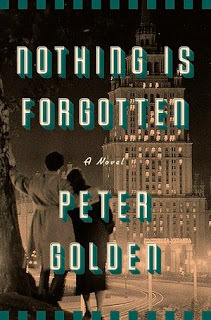
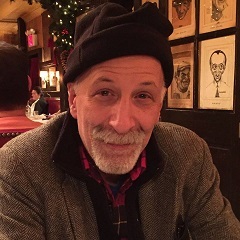
I've interviewed Peter Golden before and I'm even more honored to interview him again! Golden is the author of Quiet Diplomat,Another Bow, Comeback Love, O Powerful Western Star! and Wherever There is Light. His latest, Nothing is Forgotten, is a thriller about the Cold War and the Holocaust.
During the course of his career, Peter Golden has interviewed Presidents Richard Nixon, Gerald Ford, Ronald Reagan, and George H.W. Bush; Secretaries of State Henry Kissinger, Alexander Haig, George Shultz, and Lawrence Eagleburger; Israeli Prime Ministers Yitzhak Rabin, Shimon Peres, and Yitzhak Shamir; and Soviet President Mikhail Gorbachev.
I'm so thrilled to have you here, Peter!
I loved, loved, loved this book. Couldn’t stop reading because the characters were so unexpected, because I wanted them to hang around. What was the “why now” moment that got you writing this?
One morning I woke up remembering a story my mother told me when I was young. She was eight years old and running through an empty schoolyard chased by two older boys. The boys had German names and they were calling her a kike. My mother had never advertised her religion, and with her blond-brown hair and cameo features she resembled Shirley Temple. Yet somehow the boys knew, probably because she did not attend school on Rosh Hashanah and Yom Kippur—the Jew holidays, a girl in her class had called them. Halfway across the schoolyard, the boys caught her and pushed her to the ground. One of them had his knees on her chest – he was laughing—and the other boy had unwound a wire hanger and jabbed the point toward her eye. My mother recalled the scene as drained of color and sound, as if she were watching another girl writhing and screaming in the black-and-white flicker of a silent movie. Suddenly, the principal appeared, a burly man in a three-piece suit, and dragged the boys back to the school, and my mother stood up and ran home. This was 1936. In Hillside, New Jersey.
When I began writing right after college, I knew that one day I’d write a novel dealing with the Holocaust. That morning I decided it was time to start.
You have said that this was the most difficult book you have ever written? Tell us why!
Several reasons. First, what can a writer say about the Holocaust in the wake of—to name just a few—Night, Schindler’s List, and The Nightingale? I solved that problem by mainly exploring how Americans became more familiar with the event—beginning with the Eichmann Trial—and how the issue of Nazi war criminals seeped into the Cold War and turned into a battleground for American and Soviet spies. Secondly, while I had written history, biography, and novels about postwar America, I knew far less about the postwar Soviet Union, and I had to bury myself in research—books and interviews and documentaries. And finally, while I had grown up in the shadow of the Holocaust, and some of my extended family had died in that insanity, there was much more to read and newsreels to watch. Doing this research I fluctuated between rage and a sadness so deep I couldn’t see the bottom. It was exhausting.
I loved all the details, especially about Nikita Khrushchev. What was your research like? Did anything surprise you?
American culture and politics of the late 1940s, 1950s, and 1960s is an obsession of mine. I could spend days on eBay looking at magazines, toys, furniture, clocks, and record albums from those decades and not feel as if I’m wasting my time. For Nothing Is Forgotten, however, I needed to learn about the postwar Soviet Union, specifically Soviet baby boomers. I did that through interviews and by reading oral histories. And it was stunning: many of these men and women were every bit as enthralled with the Beatles and Levi’s and the Beat writers as their American counterparts. But the price some of them paid was unimaginable—prison or being banned from decent jobs for being bad communists. And still they never lost their faith in rock & roll. . . . the promise of that music, the freedom.
I’m always interested in how a writer approaches a new novel. What was different about writing Nothing Is Forgotten? Do you feel like you learned anything from the last book you wrote, or is it all new every time? (I’m the latter, sigh.)
My approach is generally the same. Research until I feel as though my head is about to explode, and the only cure is to write. But you are correct—it is often the same hard slog due to the fact that blank pages haven’t figured out a way to fill themselves. Yet I have learned to avoid certain mistakes—for instance, cutting details that add little. When I fail to do that I just make believe it’s a function of my style. I maintain that style is a literary euphemism for bad habits.
What’s obsessing you now and why?
Two characters, Misha and Yuli, from Nothing Is Forgotten. I can’t let them go. Their story isn’t finished. And I want to finish it.
What question didn’t I ask that I should have?
More like wish you had, because there is no way you could’ve known about some Robert Frost lines I’ve been thinking about since I read them in high school.
Frost wrote: How are we to write/The Russian novel in America/As long as life goes so unterribly?
It was a good question, and in Nothing Is Forgotten I did my best to recreate those differences.
<!-- /* Font Definitions */ @font-face {font-family:"MS 明朝"; mso-font-charset:78; mso-generic-font-family:auto; mso-font-pitch:variable; mso-font-signature:-536870145 1791491579 18 0 131231 0;} @font-face {font-family:"Cambria Math"; panose-1:2 4 5 3 5 4 6 3 2 4; mso-font-charset:0; mso-generic-font-family:auto; mso-font-pitch:variable; mso-font-signature:-536870145 1107305727 0 0 415 0;} @font-face {font-family:Cambria; panose-1:2 4 5 3 5 4 6 3 2 4; mso-font-alt:Cambria; mso-font-charset:0; mso-generic-font-family:auto; mso-font-pitch:variable; mso-font-signature:-536870145 1073743103 0 0 415 0;} @font-face {font-family:TimesNewRomanPSMT; mso-font-alt:"Times New Roman"; mso-font-charset:0; mso-generic-font-family:roman; mso-font-pitch:variable; mso-font-signature:-536859921 -1073711039 9 0 511 0;} /* Style Definitions */ p.MsoNormal, li.MsoNormal, div.MsoNormal {mso-style-unhide:no; mso-style-qformat:yes; mso-style-parent:""; margin:0in; margin-bottom:.0001pt; mso-pagination:widow-orphan; font-size:12.0pt; font-family:Cambria; mso-ascii-font-family:Cambria; mso-ascii-theme-font:minor-latin; mso-fareast-font-family:"MS 明朝"; mso-fareast-theme-font:minor-fareast; mso-hansi-font-family:Cambria; mso-hansi-theme-font:minor-latin; mso-bidi-font-family:"Times New Roman"; mso-bidi-theme-font:minor-bidi;} p.bodytextfirst, li.bodytextfirst, div.bodytextfirst {mso-style-name:"body text first"; mso-style-unhide:no; mso-style-qformat:yes; margin-top:12.0pt; margin-right:0in; margin-bottom:0in; margin-left:0in; margin-bottom:.0001pt; line-height:200%; mso-pagination:widow-orphan; font-size:12.0pt; mso-bidi-font-size:14.0pt; font-family:"Times New Roman"; mso-fareast-font-family:"Times New Roman"; mso-bidi-font-family:TimesNewRomanPSMT; mso-bidi-language:EN-US;} p.BodyText1, li.BodyText1, div.BodyText1 {mso-style-name:"Body Text1"; mso-style-unhide:no; mso-style-qformat:yes; mso-style-parent:"body text first"; margin:0in; margin-bottom:.0001pt; text-indent:.5in; line-height:200%; mso-pagination:widow-orphan; font-size:12.0pt; mso-bidi-font-size:14.0pt; font-family:"Times New Roman"; mso-fareast-font-family:"Times New Roman"; mso-bidi-font-family:TimesNewRomanPSMT; mso-bidi-language:EN-US;} .MsoChpDefault {mso-style-type:export-only; mso-default-props:yes; font-family:Cambria; mso-ascii-font-family:Cambria; mso-ascii-theme-font:minor-latin; mso-fareast-font-family:"MS 明朝"; mso-fareast-theme-font:minor-fareast; mso-hansi-font-family:Cambria; mso-hansi-theme-font:minor-latin; mso-bidi-font-family:"Times New Roman"; mso-bidi-theme-font:minor-bidi;} @page WordSection1 {size:8.5in 11.0in; margin:1.0in 1.25in 1.0in 1.25in; mso-header-margin:.5in; mso-footer-margin:.5in; mso-paper-source:0;} div.WordSection1 {page:WordSection1;} </style><b> </b>
Published on April 07, 2018 10:42
Adrienne Sharp talks about THE MAGNIFICENT ESME WELLS, the glittery heyday of Las Vegas, how her character Esme started out as a boy, shape-shifting titles, and so much more
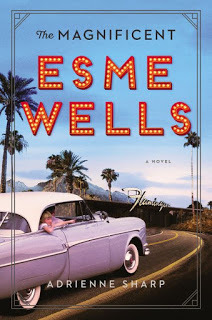
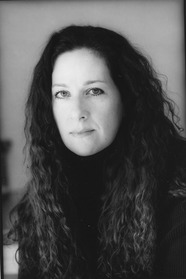
I'm absolutely thrilled to host Adrienne Sharp here. She entered the world of ballet at age seven and trained at the prestigious Harkness Ballet in New York. She is the author of The True Memoirs of Little K, White Swan, Black Swan and The Sleeping Beauty. Her latest, The Magnificent Esme Wells, is about love, loss, showgirls, gangsters and the golden age of Hollywood and Las Vegas--and it's as extraordinary as Esme herself. Says Publisher's Weekly, "Nothing if not magnificent."
I say it, too. Thank you sop much, Adrienne, for being here.
First, can we talk about the voice of Esme? It was so intimate, so alive, that I felt as if she were sitting across from me. How did that come about?
Through much trouble and wasted time, like almost all things having to do with writing. My character Esme actually started out as a young boy, Flynn, with his perspective rendered in third person. I’d just finished four years of work on my last novel, The True Memoirs of Little K, employing the first-person voice of a hundred-year-old woman looking back on her life in imperial Russia. So I didn’t want to write once again from the perspective of yet another girl or woman, or from, again, the first person point of view.
But, unfortunately or maybe not so unfortunately, Flynn’s character fell flat. So I tried him again as a middle-aged gay man, a choreographer, writing about his parents and his mother who became the burlesque dancer that Esme ultimately becomes. That wasn’t working either. Then I tried telling the story by alternating first person between Esme’s mother and her father. Also not good.
Finally, I turned the child Flynn into the child Esme, and somehow with that change, her spunky, observant character emerged and she took over the material.
I always want to know what was the moment when you knew that this was your next book? Was anything haunting you?
My mother’s parents abandoned her when she was a little girl, leaving her in a Baltimore orphanage while they took off to Los Angeles with their new baby boy. I think they imagined a baby would be a lot less trouble to care for than a seven year old (who had to go to school and do homework, etc) in their new breezy life. I never met these grandparents, but I heard stories about them and about my uncle’s miserable years with them. They lived in the cheap hotels that sprang up around the big racetracks of Hollywood Park, Santa Anita, and Del Mar, where my grandfather bet and sold tip sheets. My uncle never went to school and instead hung around the streets and the track, a small illiterate urchin. Both of them envied each other’s lives—but I can tell you this, my uncle’s life is one long, broken wreckage and my mother’s life one of success and stability because she was spared the parents she longed for.
With this novel, I collapsed together the experiences of both my mother and my uncle, and I imagined a life for my character out West with these reckless narcissists.
How different is the finished novel from where you started?
I had intended the novel to focus solely on Esme’s childhood with her parents in Los Angeles, their eventual move up to the San Fernando Valley where I imagined her mother might feel suffocated as a housewife, and ultimately the family’s decision to head to Vegas where the mother could dance and the father could gamble. I thought the book would end with the three of them in the car, heading that way. But Vegas became too interesting to me and Esme as a child and then a young woman too interestingly malleable to ignore, and so the book shifted and now covers two periods: 1939 Los Angeles and the early Vegas of the forties and fifties.
What was your research like? Did anything spin the narrative into a new direction? What surprised you the most?
Reading about Las Vegas and the blossoming of the early vaudeville-like dancing girls of the early forties into the gorgeous iconic showgirls of the late fifties and early sixties are part of what led to the development of all those Las Vegas sections in the book.
As well, the discovery that Vegas was built by Jewish mobsters and racketeers, which I didn’t know, and that it was a major depot for drug trafficking and money laundering, which I also didn’t know, made the city irresistible. Hollywood may be one Jewish empire, but Las Vegas is another, built by its own rough-mannered moguls who made a place for themselves in the desert.
I underlined one of your last sentences, which spoke of the “dirty radiant light” of Vegas, which I think gorgeous encapsulates what Vegas is, the sense that if you dig among the debris, you might find a jackpot. Can you talk about Vegas then and now, please?
Early Vegas was low-key. The hotels were smaller, built to a smaller scale, the casinos were smaller and more intimate with few tables, the hotel rooms themselves were simple and cheap, and the food even cheaper. Vegas was like a family, everybody knew everybody on the Strip, and the relationships between the new hotel people and the original ranchers and residents were somewhat fraught. Polite society vs criminal interlopers. By the late fifties, the hotels were starting to add towers, and by the sixties the Strip was beginning to turn into the spectacle it is today, with giant themed hotels and huge impersonal casinos and the hundreds of retail shops within. I’m probably the only person who goes to Vegas and asks for a desert view, not for a view of the Strip, because that Paradise Valley desert is the truly magnificent landscape. And, now, of course, with that horrific massacre at Mandalay Bay, Vegas seems terrifying in its excesses, a stage for every deadly sin.
What’s obsessing you now and why?
I’m working now on a novel set during the summer of 1975, about a family besieged by illness and ambition, family I knew. I found out recently one of their sons was murdered. He and his charismatic family have haunted me for decades. Now I’m even more haunted. His mother and grandmother are also dead, and so I want to celebrate their lives and the restless energy that drove them all.
What question didn’t I ask that I should have?
The title of the novel underwent as many revisions as the book. First it was called Hollywoodland, then Lake Hollywood, then H, then The Abandon, then The Hour of Two Lights, then Survival City, then The Haphazard Education of Baby E, then The Miseducation of Baby E, and finally, The Magnificent Esme Wells. I think I like that one best of all, which is good, since it’s been elected the title!
Published on April 07, 2018 10:23
One of my absolute favorite writers, Elizabeth Crook talks about THE WHICH WAY TREE, set in Civil-War era Texas and compared to Huck Finn, getting the hang of how people spoke then, writing characters facing grave risk, and so much more
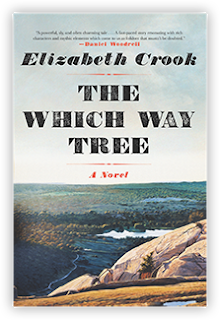
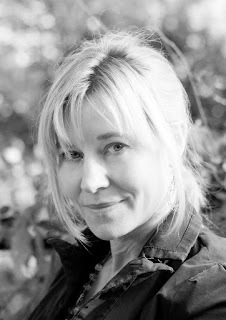
A few years ago, I was handed a galley to read, Monday, Monday, about three students caught up the Charles Whitman massacre, a horrific event which impacts them through adulthood. I went nuts for this book. and vowed to read everything that Elizabeth Crook writes. Now, Elizabeth Crook is back with a book that is equally--if not even more--stunning, The Which Way Tree, set in Civil-War era Texas, about a young girl, her half-brother Benjamin, who narrates the book, and a search for the panther that killed her mother. (It's also been optioned for film with Robert Duvall to star.)
Racking up the raves:
“Not since True Grit have I read a novel as charming, exciting, suspenseful, and pitch-perfect as The Which Way Tree. Elizabeth Crook’s new book is winning from first page to last.”
—Ron Hansen, author of The Kid and The Assassination of Jesse James by the Coward Robert Ford
“Elizabeth Crook has created a book of marvels. Its comedy is steeped in the hardscrabble tragedies of a wilder old America. You will even catch an echo of Twain’s wit in the picaresque narration.” —Luis Alberto Urrea, author of the national bestseller The Hummingbird’s Daughter
“A multilayered tale . . . Benjamin Shreve, the teenage narrator of The Which Way Tree, unspools his tale of Civil War-era Texas in a voice that is utterly convincing, consistent, and believable. Crook never slips out of that voice for a moment. This is no small feat... Any first-person voice involving a young Southern boy invites comparisons to Huck Finn. But dialects have complexities and Crook appears to be a master of them. Benjamin's voice swings between the rhythms of the Southern hills and the lofty, elevated tone encountered in Twain and contemporary Westerns . . . His speech can switch from hyperbole to understatement in the same sentence--and it is a wonderfully deadpan understatement . . . The language is arresting . . . The Which Way Tree is a commendable and very readable addition to the tale-spinning tradition and its beautiful use of language.”
―Paulette Jiles, New York Times Book Review
Elizabeth is also the acclaimed author of five novels: The Raven's Bride and Promised Lands; The Night Journal, Monday, Monday. Her first novel, The Raven's Bride, was the 2006 Texas Reads: One Book One Texas selection. The Night Journal was awarded the 2007 Spur award for Best Long Novel of the West and the 2007 Willa Literary Award for Historical Fiction. Monday, Monday was awarded the 2015 Jesse H. Jones award for fiction.
Only thing better than having you on the blog, Elizabeth, would be to get coffee with you. And pie. There has to be pie.
I always want to know the why now moment for writing a book? What was haunting you?
Specifically, a very large mountain lion. When my son was fourteen he got lost with a friend in the canyons of Bandera County. They were brought in by helicopter at three o’clock in the morning after a nine hour search during which a large mountain lion was seen stalking through the canyon where they were last known to be. My husband and I spent those hours with the deputy sheriff of Bandera and other searchers trekking through canyons and ravines and yelling the boys’ names into the darkness. When the helicopter pilots finally spotted them, the deputy sheriff hiked down to bring them out and saw the mountain lion watching them at their little campfire. They didn’t know it was there. He told me later, “I don’t mean to scare you, ma’am, but when I got there that cat had its eyes on your boys.” Almost certainly the cat was only curious and wouldn’t have harmed anyone. But those words left me with a powerful image, and afterwards I learned everything I could about mountain lions—or panthers, as they were called in the old days—and their rare but sometimes deadly attacks on humans. In the end, this led to writing The Which Way Tree.
I love the narrator, Benjamin, who is a teenager. How did you get both the voice of a teenager, and particularly one in the Civil War, right? The dialect was absolutely perfect.
That’s the nicest compliment, Caroline. It was really a matter of reading a lot of letters and journals from that time period and getting the hang of how people spoke. Often the most uneducated people were the most interesting writers. They tended to write as they spoke instead of in any stylized, instructed manner. There was often a Biblical lyricism to their speech and an unexpected combination of advanced vocabulary and poor grammar. I’ve lived most of my life in Texas, and that probably helped too. I’ve grappled with a lot of characters as they evolve through various drafts, but with Benjamin it was different somehow. I’m not sure why. I just felt I knew him from the beginning—from the first words out of his mouth. At every turn, I knew what he would think, how he would feel, and what he would say.
What was your research like? What surprised you about it?
The research involved a lot of pouring through books to understand the period—which of course meant knowing the politics of that time and place as well as the details of daily life and how people managed. The surprising thing was how irrelevant most of the research became, since the story is intensely built around only a handful of characters, a short period of time, and a single panther hunt. Most of the drama takes place during three short days. Of course, there are the peripheral events, which required me to know how the Civil War played out in the Texas Hill Country. But the story itself has a tight focus and required little more than knowing the characters and telling their story.
I also always want to know how a new book feels different than the last one for the author. Did you feel like your last novel taught you how to write this one?
Not at all, since this one is so different from Monday, Monday. I’ve written five novels, and they’re all vastly different except that each of them deals with characters who are at significant risk and facing grave odds. There’s always that common theme of danger: if my characters aren’t in danger, or at least at some kind of risk, then I don’t worry about them enough to get emotionally involved in what happens to them. And as you know all too well, if a writer isn’t completely engaged by what he or she is writing, and invested in the characters and the choices they make and the fates that unfold for them, then readers won’t be either.
What’s obsessing you now and why?
Just what in the world to write next! I’m not happy if I’m not writing, and unfortunately I’m not one of those writers with a thousand ideas just waiting to be put into words!
What question didn’t I ask that I should have?
You always ask the perfect questions, Caroline. It’s a great gift of yours. Thank you for your interest, and always for you insight.<!-- /* Font Definitions */ @font-face {font-family:"MS 明朝"; panose-1:0 0 0 0 0 0 0 0 0 0; mso-font-charset:128; mso-generic-font-family:roman; mso-font-format:other; mso-font-pitch:fixed; mso-font-signature:1 134676480 16 0 131072 0;} @font-face {font-family:"Cambria Math"; panose-1:2 4 5 3 5 4 6 3 2 4; mso-font-charset:0; mso-generic-font-family:auto; mso-font-pitch:variable; mso-font-signature:-536870145 1107305727 0 0 415 0;} @font-face {font-family:Cambria; panose-1:2 4 5 3 5 4 6 3 2 4; mso-font-charset:0; mso-generic-font-family:auto; mso-font-pitch:variable; mso-font-signature:-536870145 1073743103 0 0 415 0;} /* Style Definitions */ p.MsoNormal, li.MsoNormal, div.MsoNormal {mso-style-unhide:no; mso-style-qformat:yes; mso-style-parent:""; margin:0in; margin-bottom:.0001pt; mso-pagination:widow-orphan; font-size:12.0pt; font-family:Cambria; mso-ascii-font-family:Cambria; mso-ascii-theme-font:minor-latin; mso-fareast-font-family:"MS 明朝"; mso-fareast-theme-font:minor-fareast; mso-hansi-font-family:Cambria; mso-hansi-theme-font:minor-latin; mso-bidi-font-family:"Times New Roman"; mso-bidi-theme-font:minor-bidi;} .MsoChpDefault {mso-style-type:export-only; mso-default-props:yes; font-family:Cambria; mso-ascii-font-family:Cambria; mso-ascii-theme-font:minor-latin; mso-fareast-font-family:"MS 明朝"; mso-fareast-theme-font:minor-fareast; mso-hansi-font-family:Cambria; mso-hansi-theme-font:minor-latin; mso-bidi-font-family:"Times New Roman"; mso-bidi-theme-font:minor-bidi;} @page WordSection1 {size:8.5in 11.0in; margin:1.0in 1.25in 1.0in 1.25in; mso-header-margin:.5in; mso-footer-margin:.5in; mso-paper-source:0;} div.WordSection1 {page:WordSection1;} </style> -->
Published on April 07, 2018 10:14



